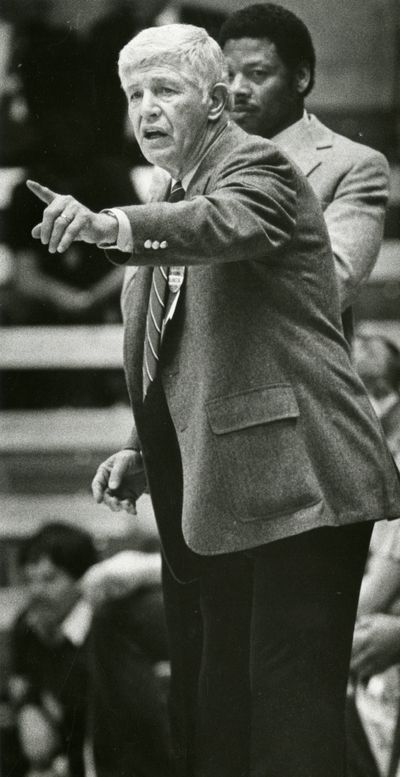Blanchette: Beloved Harshman worthy of accolades

Jim McKean remembers receiving hand-written recruiting letters from Marv Harshman on Washington State letterhead – the requisite flattery there but measured, with an implication of mutual need deserving mutual investment.
“He seemed straightforward and sincere,” said McKean, “and guess what? He was straightforward and sincere.”
Those characterizations have been applied liberally in the tributes to Marv Harshman, who died Friday at the age of 95. And others, too.
Gentleman. Competitor. Teacher. Friend. All-American athlete. Hall of Fame coach for a 40-year career at Pacific Lutheran, WSU and Washington. Given to unvarnished honesty and uncomplicated compassion. Unambiguous. Oh, and often enough a little bit of hell on referees.
Umpires, too.
Let’s go to the highlights:
• The benches empty at a UCLA-Wazzu baseball game at old Bailey Field, Cougar shortstop Manny Perez gets tossed and coach Bobo Brayton charges out to confront the ump. So does Harshman, whose uniform that day consisted of Bermuda shorts and a fishing cap. But he and Bobo had shared an office for years and he had a son playing left field, and there was Cougar honor that needed defending. Soon enough, both men are ejected, too – the last (and lasting) image of them walking arm in arm into Hollingbery Fieldhouse.
• The Cougar basketball team is playing West Virginia in the Far West Classic. Harshman and assistant Jud Heathcote are working the officials hard, and veteran referee Frank Buckiewicz has had enough, warning them that the next time either gets out of his seat, it’s a technical. A bad call is, of course, ordained. Heathcote starts to leap up and Harshman reaches out to stop him, flipping him back over his chair.
“Are you all right?” Harshman asks when order is restored.
“My attorney will be in touch Monday morning,” Heathcote replies.
This evidence is presented only to reaffirm that Harshman wasn’t just some basketball grey eminence with stick of chalk and a blackboard, but that he burned to win – and receive a fair shake. And yet the desire never overwhelmed the dignity.
“I used to say that if you lined up the greatest human beings, Marv might not be No. 1,” Heathcote said, “but he’d certainly be in the top two.”
Unofficial rankings, like those of greatest coaches. Harshman left the college game in 1985 with 637 wins when only six men had more, a group that included names like Rupp, Allen, Iba and Wooden.
What’s unlikely is that any coaxed more out of their players than Harshman did out of his. Wooden himself acknowledged as much. The Wizard wasn’t going to trade Lew Alcindor or Bill Walton for McKean or Ted Wierman or Jim Meredith, the tallest thing from Anaconda, Mont., other than the smokestack.
Harshman would have coached no fewer than four NCAA tournament teams for WSU in the ’60s if not for UCLA’s insane dominance and the protocol that allowed in only conference champions. So celebrations were more muted than they could have been, but McKean remembers looking across the room after the Cougars beat the Bruins in 1966 and seeing “how overwhelmed and moved” his coach was.
If he made players better, he also made plays better. Heathcote insisted Harshman was “an offensive genius. No matter what play I came up with, Marv would improve it with an adjustment.”
But there was a playful side, too, that often was missed – the episode in Eugene when the Cougars broke out the Groucho Marx nose-and-glasses to upstage Dick Harter’s glaring storm troops. Even the famed practice session with tennis rackets to emulate Alcindor’s wingspan may have been as much whimsy as strategy.
“It was fun – you see us smiling in the pictures,” said McKean, “and given who we were up against, we needed some fun.”
Unfortunately, Harshman couldn’t coach up school presidents. Glenn Terrell’s indifference chased him away to Washington for a whopping $4,000 raise. At UW, William Gerberding forced his retirement because he wanted someone with a nicer haircut, and the program was sent into a tailspin.
Remarkably, in a state where the alums of the two big schools regard each others’ teams with utter disdain, Harshman was universally embraced even after his jump. Ray Stein, a McKean teammate, remembers Harshman’s final UW-WSU game in Seattle when 200 of his former players going back to his first PLU team came to honor him at halftime.
That highwire act isn’t lost on Clay Damon. He left Spokane to play for Harshman at UW in 1983, even though his family had deep WSU roots.
“It’s tough to be a Husky on the Cougar side of the state,” he said with a laugh. “I think it’s amazing how he managed to be so beloved by fans of both schools.”
But the love of those players? Not so amazing at all.
“I had no doubt basketball and our contribution to the game meant everything to him,” said McKean. “And maybe knowing that makes you play all that much harder.”
Marv Harshman’s legacy needn’t be any more straightforward than that.